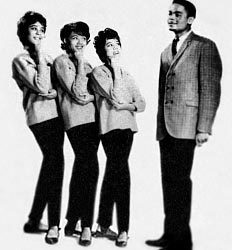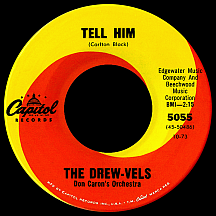THE DREW-VELS
Tell Him
The soul music scene in Chicago, Illinois during the 1960s can be extended to include the suburb of Evanston, located on the western edge of Lake Michigan some 20 miles north of the Windy City. In 1963, Carlton Black's group The Duvals, with lead singer Charles Perry, put out a single on the small Boss label, a doo woppin' dance number called "Cotton." Bass singer Black had his eye on a local girl, Erma Drew, who sang in church with her sisters Patricia and Lorraine (with the younger Cynthia, Tina and Rosalind, there were six sisters total). Patricia, born in Charleston, South Carolina in 1944, was the oldest; a move to Nashville preceded the family's settling down in Evanston when she was eleven years old. Her mother unintentionally made a music biz connection while working as a housekeeper for Maury Lathower, a Capitol Records promo rep based in Chicago. She told him about her wondrously talented offspring...and he soon found out she wasn't exaggerating!
The three older siblings made an audition tape that included "Tell Him" (originally "Tell Her"), a song written by Carlton for his group. Convinced he'd found something worthwhile, Maury tipped off Peter Wright and his business partner Don Caron, a Chicago-based bandleader who had his own production company. A plaintive ballad ('...if you ever find that love of mine...tell him to forgive me...') in stark contrast to the major hit of the same title from several months earlier by The Exciters of Queens, New York, the song was recorded at a local studio and released on Capitol under the name The Drew-Vels in the fall of '63, an outstanding debut effort with Carlton's 'bom-bom-ba-doo-doo-doo' bass and a moving lead vocal by Patricia (professionally known as Patti Drew from this point on). Hometown radio led the way in December 1963; it hit the top 20 in Chicago the following month and made a strong showing in several west coast cities in February and March 1964, resulting in a brief appearance on the lower rungs of the national charts.
In March, the Drew-Vels performed at Chicago's Regal Theater, opening an all-star show headlined by two of Chi-Town's hottest soul stars, Gene Chandler and Major Lance. Another of Carlton's songs, "Everybody Knows," captured the verve of "Tell Him" without sounding like a copy though this second Capitol single sparked little interest beyond the Great Lakes. Black, Perry and the Duvals benefited from their connection to the Drew-Vels, landing a contract with Smash Records under a new name, The Naturals. There were three singles over the next year, all written by Black, including "Let Love Be True" and "Hey, Little Girl," after which the act broke up; one member, Andrew Thomas, later joined The Marvelows (the "I Do" group) while Carlton continued as the sole male Drew-Vel. He and Patti penned "Creepin'," a lively track with a more prominent Don Caron horn section, the third and final Capitol single.
At the suggestion of Wright and Lathower, Patti opted to pursue a solo career. Carlton kept the Drew-Vels going for another year or so with Erma (they were later married), Lorraine and, for a short time, fourth sis Cynthia. They had one single on Quill, a Chicago label that ultimately specialized in recording garage rock bands from the area; "Chilly Kisses" (penned by Carl Spencer, best-known for Billy Bland's hit "Let the Little Girl Dance") had no lead, instead relying on unison singing. Quill issued Patti's initial solo effort in '65; "Sufferer" eschews the sentimentality for a new Drew with an attitude. Another Quill solo 45 put an entirely different spin on "It's All Over Now," the tune that had been a hit in '64 for Bobby Womack's family act The Valentinos and, more notably, The Rolling Stones. Capitol took notice of these two singles and in early 1967 Patti signed a solo deal with the iconic record company at Hollywood and Vine, though many of her recordings were made at Chicago's Chess studio.

A curious decision was made to rework "Tell Him" as her first Capitol single, varying the arrangement only slightly from the Drew-Vels original. Carlton Black reprised his bass part, nearly indistinguishable from the previous recording; a horn section replaced the more subtle organ sound and there's a slight change in the melody, as the line 'Tell him that I love him...tell him that I care...' is raised an octave. Patti's voice sounds just as fresh and sincere as it did the first time around. In the summer of '67 it reached the R&B top 30 and made a minor showing on the pop charts (as the Drew-Vels had). The next three singles struggled, but this time Capitol was committed to making her a star.
"Workin' on a Groovy Thing," composed by Neil Sedaka and Brill Building lyricist Roger Atkins, became Patti's biggest seller, her emotional approach ideal for lines like '...ecstasy is a reality.' It was a top ten hit in many cities around the country in the summer and fall of 1968, but somehow couldn't muster enough juice nationally to get into the top 40! A year later, a fine but far less definitve version by The 5th Dimension reached the top 20 on the strength of the group's momentum and superstar "Aquarius" status of '69, in the process all but burying the memory of Patti's version...except in cities where her recording had been a big hit and stations chose to ignore the 5D remake (as was the case in Los Angeles, where I grew up). "Hard to Handle" came next and she gets points for doing a fearless female cover of Otis Redding's hit, but it misfired. The label had failed to "Capitolize" on the admittedly limited success of "Workin'." Her career seemed to fall short of expectations at every turn, her fabulous voice unappreciated due to timing or, perhaps, some intangible factor; Capitol released a dozen singles and four albums between 1967 and 1970, but beyond generally positive reviews, nothing really caught on.
A heavy tour schedule was an entirely different sort of challenge for the singer. She traveled with a band but preferred the time when her sisters were with her. She performed at the original Playboy Club in downtown Chicago, where they billed her as "Pretty Patti Drew." Too often she played for unappreciative audiences in small towns where her songs weren't even known. She began using drugs as a way to deal with all the pressure. In the summer of '69, "The Love That a Woman Should Give to a Man" (an early effort by film composer Angelo Badalamenti) had a brief run on the R&B charts. When Capitol dropped her around the beginning of 1971, even Peter Wright (by that time part owner of Twinight Records, the label that broke soul singer Syl Johnson) was no longer interested. She emerged briefly in 1975, drug free, with a disco 45 on the Innovation label, "The Mighty O.J." For a time in the 1980s, Patti and brother-in-law Carlton Black sang at events in the Chicago-Evanston area. Frustrated that all the hard work had left her with so little notice or monetary gain, Patti Drew packed it in, a premature decision, perhaps, but the music business is often unforgiving, even to those with obvious talent.


